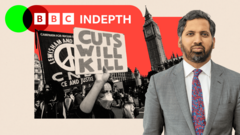Will Trump's Warning Signal a Darker Future for Iran?

Understanding the Dynamics of U.S.-Iran Relations: A Deep Dive
U.S.-Iran relations have been a focal point of geopolitical tension for decades. The interactions between these two nations have evolved through various regimes, conflicts, and negotiations. Recent commentary from prominent figures, including former President Donald Trump, highlights ongoing disputes and the complex nature of diplomacy in the region. This article explores the roots of U.S.-Iran relations, significant events that have shaped their interactions, and the implications of current political rhetoric on future diplomacy.
The Historical Context of U.S.-Iran Relations
To understand the current dynamics between the United States and Iran, it is essential to consider their historical relationship. The turning point can be traced back to the 1953 CIA-led coup that overthrew Prime Minister Mohammad Mossadegh, replacing him with Shah Mohammad Reza Pahlavi. This coup sowed seeds of distrust among Iranians toward the U.S., which were further exacerbated by the Shah's autocratic rule and close ties with Washington.
The 1979 Iranian Revolution
The 1979 Iranian Revolution marked a significant shift in U.S.-Iran relations. The overthrow of the Shah led to the establishment of the Islamic Republic under Ayatollah Khomeini. This new regime was vehemently anti-American, primarily due to U.S. support for the Shah, whom many Iranians viewed as a puppet of Western powers. The storming of the U.S. Embassy in Tehran and the subsequent hostage crisis further solidified the enmity between the two nations.
The Era of Sanctions and Nuclear Tensions
Following the revolution, the U.S. imposed a series of sanctions on Iran, particularly in response to its nuclear ambitions. The tensions escalated in the early 2000s as Iran pursued its nuclear program, leading to fears of nuclear proliferation in the Middle East. The international community, particularly the U.S. and its allies, responded with diplomatic efforts and increased sanctions.
The Obama Administration and the Iran Nuclear Deal
A significant turning point in U.S.-Iran relations occurred during the Obama administration. In 2015, the Joint Comprehensive Plan of Action (JCPOA), commonly known as the Iran Nuclear Deal, was signed. This agreement aimed to curb Iran's nuclear program in exchange for the lifting of economic sanctions. The deal was hailed as a diplomatic triumph, but it faced criticism from various factions within the U.S. and Iran.
Trump's Withdrawal from the JCPOA
In 2018, President Donald Trump announced the U.S. withdrawal from the JCPOA, reinstating heavy sanctions on Iran. This decision significantly escalated tensions, leading to a series of confrontations between the two nations, including military skirmishes and cyber-attacks. Trump's administration adopted a hardline approach toward Iran, emphasizing a "maximum pressure" strategy aimed at crippling Iran’s economy and compelling it to renegotiate its nuclear program and address its regional activities.
Current Rhetoric and Its Implications
Recent statements by Trump regarding Iranian leadership reflect ongoing animosities. His comments about Iran's Supreme Leader, Ayatollah Ali Khamenei, illustrate the contentious nature of their relationship. Trump's assertion that he "saved" Khamenei from an "ugly and ignominious death" reveals a provocative stance that complicates diplomatic efforts.
Impact of Rhetoric on Diplomacy
Political language can significantly influence public opinion and international relations. Trump's remarks may resonate with his supporters, reinforcing a narrative of strength against perceived adversaries. However, such declarations can hinder diplomatic efforts by hardening positions on both sides. When leaders engage in combative rhetoric, it often leads to a cycle of retaliation and escalated tensions.
The Role of Regional Allies
U.S.-Iran relations cannot be fully understood without considering the role of regional allies. Countries like Israel and Saudi Arabia view Iran as a significant threat. U.S. support for these allies plays a pivotal role in shaping America's approach to Iran. Trump's administration was characterized by a strong alignment with Israel, evidenced by the 2019 recognition of Jerusalem as its capital and support for military actions against Iranian interests.
Israel's Perspective on Iran
From Israel's perspective, Iran's nuclear ambitions and support for militant groups pose existential threats. The Israeli government has consistently voiced concerns over Iran's influence in Lebanon through Hezbollah and its involvement in Syria. Israel's military operations targeting Iranian assets highlight the ongoing proxy conflicts in the region, complicating U.S. diplomatic efforts.
The Future of U.S.-Iran Relations
Looking forward, the trajectory of U.S.-Iran relations remains uncertain. The possibility of renewed negotiations hinges on various factors, including domestic political changes in both countries, regional stability, and international pressure. Key questions arise: Will the U.S. re-engage in diplomatic negotiations with Iran? Can a new agreement be reached that satisfies both nations' interests?
Potential Pathways to Diplomacy
Several potential pathways could lead to improved relations:
- Revisiting the JCPOA: A return to the negotiating table could allow for a restructured agreement that addresses both nuclear concerns and regional security issues.
- Increased Communication: Establishing direct channels of communication may reduce misunderstandings and lower the risk of military confrontations.
- Regional Security Dialogues: Engaging regional players in discussions about security and stability could foster a collaborative approach to addressing shared threats.
Conclusion
The complexities of U.S.-Iran relations highlight the challenges of diplomacy in a volatile geopolitical landscape. As political rhetoric continues to shape perceptions, the need for constructive dialogue remains critical. The future of these relations will depend on the willingness of all parties to engage in meaningful discussions and seek common ground, despite historical grievances and ongoing tensions.
What steps do you think should be taken to improve U.S.-Iran relations? #USIranRelations #Diplomacy #ForeignPolicy
FAQs
What caused the deterioration of U.S.-Iran relations?
The deterioration primarily began with the 1979 Iranian Revolution and the U.S. Embassy hostage crisis, leading to decades of mistrust and conflict.
What was the Iran Nuclear Deal?
The Iran Nuclear Deal, or JCPOA, was an agreement reached in 2015 aimed at curbing Iran's nuclear program in exchange for lifting economic sanctions.
How did Trump's policies affect U.S.-Iran relations?
Trump's withdrawal from the JCPOA and the implementation of heavy sanctions significantly escalated tensions between the U.S. and Iran.
Published: 2025-06-27 18:16:35 | Category: News



